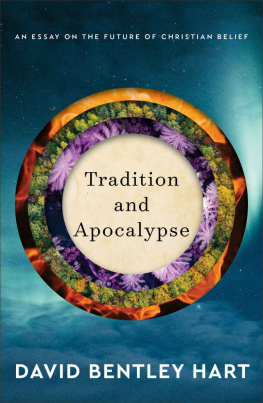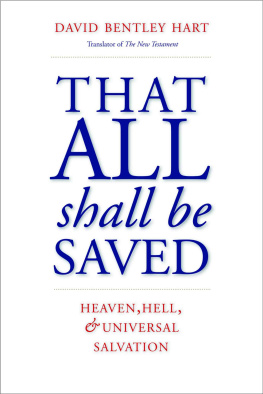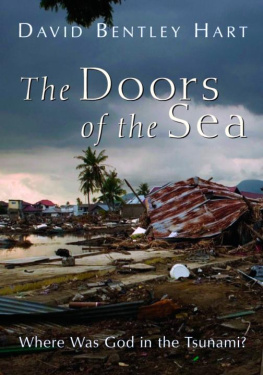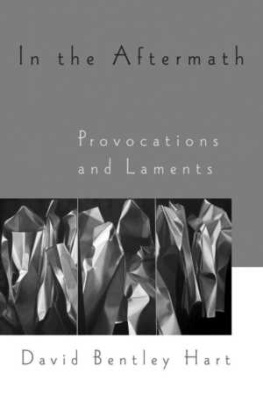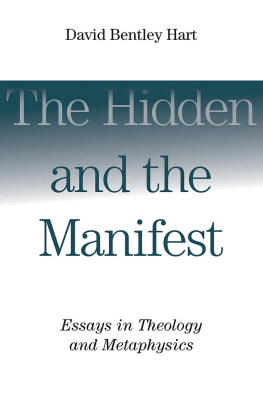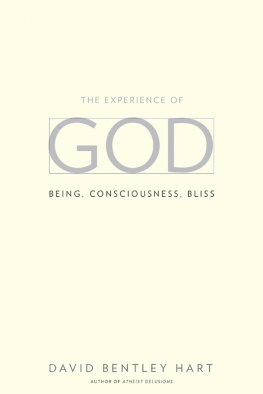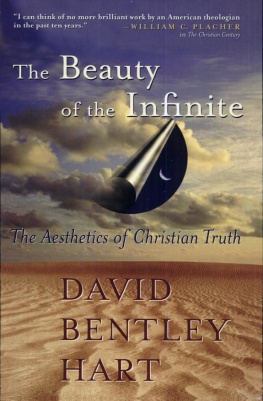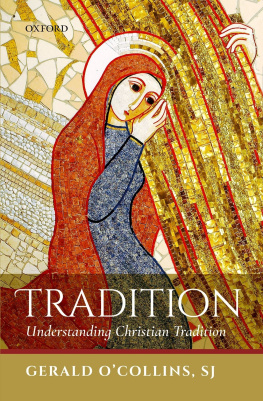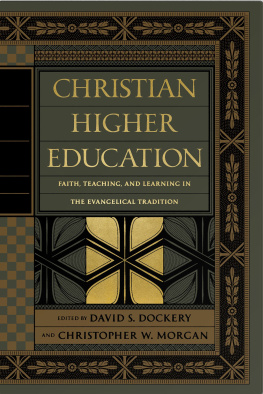I first addressed the topic of this essay in a lecture called Tradition and Authority: A Vaguely Gnostic Meditation, delivered at a conference on religious traditions and modernity held at Valparaiso University in April 2018. A version of that lecture was then printed as an article in The Idea of Tradition in the Late Modern World: An Ecumenical and Interreligious Conversation , edited by Thomas Albert Howard (Eugene, OR: Wipf & Stock, 2020). The original text of the lecture was subsequently printed in a collection of my writings called Theological Territories (Notre Dame, IN: University of Notre Dame Press, 2020). I am grateful to Howard and to all the participants at that conference: my fellow presenters James L. Heft, Ebrahim Moosa, David Novak, and Sarah Hinlicky Wilson, as well as all of those in attendance; their presentations, questions, observations, and suggestions aided me in thinking further about the issues addressed in these pages. In expanding and, I hope, deepening my original argument, I have been greatly aided by both long conversations and incidental exchanges with John Behr, John Betz, Roberto de la Noval, Brad Gregory, Grant Kaplan, John Milbank, R. Trent Pomplun, Alfred Turnipseed, and Jordan Wood, as well as many others whose contributions I have shamefully forgotten.
Tradition and Traditionalism
I
It seems clear to me that the concept of tradition in the theological sense, however lucid and cogent it might appear to the eyes of faith, is incorrigibly obscure and incoherent. This, I would argue, is true not only of the vague, popular version of that concept that a good many believers harbor but rarely think about. It is true also of the version that many (perhaps most) Christian theologians have tended consciously to adopt since the publication in 1845 of the first edition of John Henry Newmans Essay on the Development of Christian Doctrine , of 1904 has made anything like a substantial advance in theological reflection on the issues raised in that text, and then more as a supplement than as an alternative to Newmans argument. This is unsurprising, I suppose, inasmuch as tradition in this specifically theological acceptation is a very new idea, relatively considered, with no very deep roots in the tradition of the church. But the general neglect of the topic leaves a fairly enormous unresolved question in Christian thought lying quite conspicuously and troublingly open. When we speak of Christian tradition, what are we really talking about? Can we really prove the existence ofand then in fact identifya particular living, continuous, and internally coherent phenomenon that corresponds to that phrase, or will any attempt to do so find evidence only of a product of pure historical fortuity, consisting in a mere mechanically determined series of consecutive viable forms united more by evolutionary imperatives than by internal rationality? In part, I suspect that theologians have generally failed to address this question with the rigor it merits because, when frankly confronted, it inevitably yields answers contrary to their theological interests. That, however, may be a baseless supposition. One must concede that it is still a fairly new question, at least in any explicit and salient form.
Newmans treatise, after all, did not merely address the issue; it inaugurated the entire project of treating tradition as an object of theological inquiry in its own right, rather than as something merely quietly assumeda vague designation, that is, for a dogmatic and spiritual continuity across generations that Christian thought had always presupposed in its understanding of itself but had never really properly reflected upon. As the first systematic attempt to demonstrate the intrinsic rationality of Christian doctrinal and theological history as a totality, obedient to general principles of logical consistency, the Essay was nothing less than epochal in its importance. But, for all its considerable richness and subtlety, it was at the last a self-defeating exercise; ultimately, it amounted to an inadvertently sophistical effort to transform a tautology into a syllogism. Newman really did, it seems, succeed in convincing himself; at least, his good faith in the matter appears beyond doubt, if for no other reason than that writing the book apparently precipitated his conversion from high Anglicanism to Roman Catholicism. And his argument has certainly convinced or beguiled generations of devout readers. But the book remains little more than an illusionists trick for all that. It retains its power to enthrall and persuade only so long as one studiously maintains ones willing suspension of disbelief and, so to speak, keeps ones seat. If, however, one instead sneaks backstage and peers at the performance from the wings, the stage machineries and sleights of hand become all too visible, and the enchantment evaporates. We must not let in daylight upon magic, as Walter Bagehot said. And Newmans Essay , to the degree that it succeeds in convincing its readers, is a feat of magic through and through.
This is not a complaint on my part, incidentally. Nor is it to say that the argument Newman attempted was not worth the effort, or even that it was wholly fruitless. His essential intuition was correct, without doubt: Christianity claims for itself the status not merely of a revelation of Gods nature, purposes, acts, and will for his creatures, but also of the one unique and unsurpassable revelation of these things. More outlandishly, it asserts (as perhaps no other putatively revealed creed has ever done) an essential identity between the particular historical events by which that revelation was vouchsafed and the content of what was thereby made known. Thus the very category of tradition in Christian theological terms cannot be easily subsumed into any wider, more general category of religious tradition as such. Using the term in that more universal sense, tradition is merely the faithful transmission down the ages of some invariable truththeoretical or practical or mysticaloften of immemorial antiquity. The Gospel, however, by its own account, is not simply a perennial wisdom delivered throughand so, at the last, severable fromthe vehicle of the particular and local history in which it was first made manifest; it is instead a particular and local history that purports to disclose itself as the eternal and universal truth of all things. By its very nature, a claim that audacious cannot help but be marked by a kind of perilous if captivating delicacy, a fragility that calls for the most tactful and careful application of hermeneutical art. There is something so positively absurd in this precarious balancing of the whole edifice of eternal truth upon the tiny, tenuous, evanescent foundation of a fleeting temporal episode that it arrests our attention chiefly by its implausibility. And then too, of course, as Newman was obviously keenly aware, that episode can itself never be extracted from the flow of history, inasmuch as no historical event exists as a singularity; its meaningits very realityis unveiled only through history itself, by all that came before and by all that comes after; if this were not so of the event of revelation, no less than of any other historical occurrence, that event would constitute nothing more than an impenetrable enigma, without antecedents or consequents, and so would be incapable of making itself intelligible in rational terms. True, the potentially interminable interpretive labor inaugurated by that event may necessarily have acquired ever greater and more exalted metaphysical dimensions over time, ever more comprehensive propositions regarding the frame of reality in the abstract or of existence in general, ever more ahistorical asseverations about being or nature or supernature as philosophical categories; but the hard, obdurate, indissoluble matter of its reflections must always remain a set of occurrences that reportedly took place at this or that location, and of words that were supposedly spoken to this or that person, and of continuities of memory that have allegedly been sustained intact across differing ages and cultures and that have truly informed every healthy development of dogma and theology.

